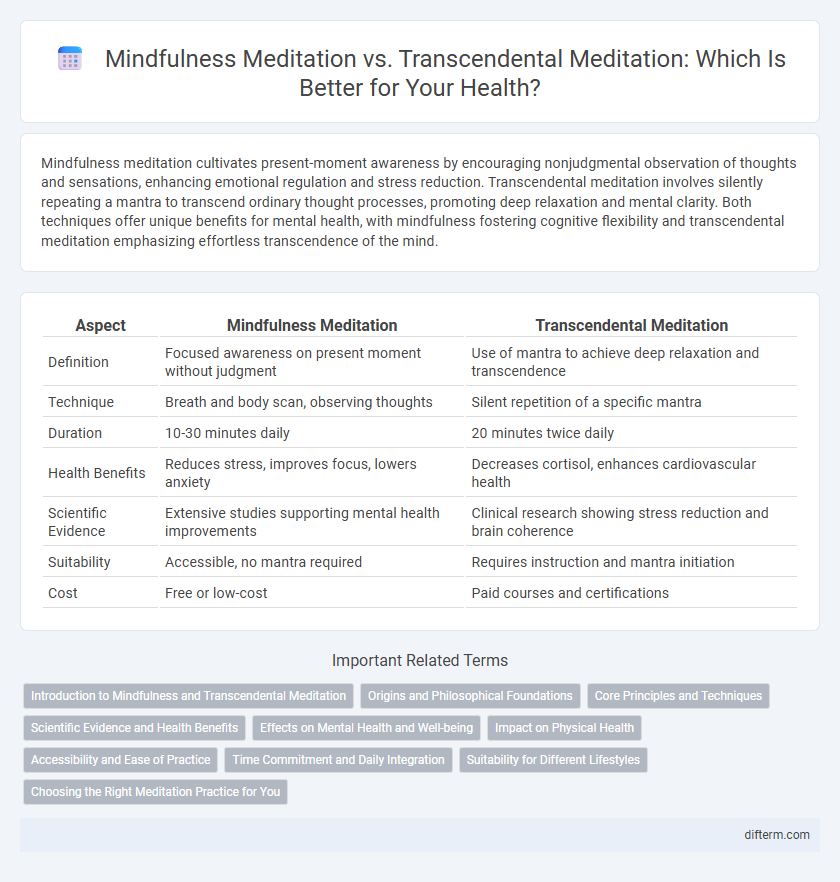Mindfulness meditation cultivates present-moment awareness by encouraging nonjudgmental observation of thoughts and sensations, enhancing emotional regulation and stress reduction. Transcendental meditation involves silently repeating a mantra to transcend ordinary thought processes, promoting deep relaxation and mental clarity. Both techniques offer unique benefits for mental health, with mindfulness fostering cognitive flexibility and transcendental meditation emphasizing effortless transcendence of the mind.
Table of Comparison
| Aspect | Mindfulness Meditation | Transcendental Meditation |
|---|---|---|
| Definition | Focused awareness on present moment without judgment | Use of mantra to achieve deep relaxation and transcendence |
| Technique | Breath and body scan, observing thoughts | Silent repetition of a specific mantra |
| Duration | 10-30 minutes daily | 20 minutes twice daily |
| Health Benefits | Reduces stress, improves focus, lowers anxiety | Decreases cortisol, enhances cardiovascular health |
| Scientific Evidence | Extensive studies supporting mental health improvements | Clinical research showing stress reduction and brain coherence |
| Suitability | Accessible, no mantra required | Requires instruction and mantra initiation |
| Cost | Free or low-cost | Paid courses and certifications |
Introduction to Mindfulness and Transcendental Meditation
Mindfulness meditation centers on maintaining present-moment awareness through focused breathing and sensory observation, enhancing cognitive flexibility and emotional regulation. Transcendental meditation involves silently repeating a mantra to transcend ordinary thought processes, promoting deep relaxation and reduced stress levels. Both practices support mental health but differ in technique and emphasis on awareness versus mantra repetition.
Origins and Philosophical Foundations
Mindfulness meditation originates from Buddhist practices emphasizing present-moment awareness and non-judgmental observation, rooted in the Satipatthana Sutta teachings. Transcendental Meditation (TM) is based on Vedic traditions from ancient India, introduced by Maharishi Mahesh Yogi, emphasizing the use of a personalized mantra to transcend ordinary thought. Both practices aim to enhance mental clarity but differ fundamentally in their philosophical foundations and techniques.
Core Principles and Techniques
Mindfulness meditation centers on present-moment awareness by observing thoughts and sensations without judgment, often practiced through focused breathing and body scans. Transcendental meditation involves the silent repetition of a specific mantra to transcend ordinary thought and achieve deep relaxation and heightened awareness. Both techniques emphasize mental clarity and stress reduction but differ in approach: mindfulness fosters non-reactive awareness, while transcendental meditation aims for a restful, alert state through mantra repetition.
Scientific Evidence and Health Benefits
Mindfulness meditation and transcendental meditation both demonstrate significant health benefits, with scientific studies revealing mindfulness meditation effectively reduces stress, anxiety, and depression by enhancing emotional regulation and present-moment awareness. Transcendental meditation is associated with lowering blood pressure, reducing cardiovascular risk, and improving cognitive function through deep relaxation and autonomic nervous system balance. Meta-analyses of randomized controlled trials confirm that both practices improve mental health and physiological outcomes, though their mechanisms and specific benefits vary.
Effects on Mental Health and Well-being
Mindfulness meditation enhances mental health by promoting present-moment awareness, reducing stress, anxiety, and depression through increased emotional regulation and cognitive flexibility. Transcendental meditation, characterized by silent mantra repetition, triggers deep relaxation and autonomic nervous system balance, leading to lowered cortisol levels and improved psychological well-being. Both practices improve brain regions associated with attention and emotional control but differ in approach and specific neural mechanisms, making them complementary options for mental health optimization.
Impact on Physical Health
Mindfulness meditation improves physical health by reducing stress, lowering blood pressure, and enhancing immune function through increased awareness of the present moment. Transcendental meditation promotes cardiovascular health by decreasing cortisol levels and improving heart rate variability, which reduces the risk of heart disease. Both practices contribute to pain management and overall physical well-being, with mindfulness emphasizing cognitive engagement and transcendental meditation focusing on effortless mental repetition.
Accessibility and Ease of Practice
Mindfulness meditation is widely accessible due to its flexibility and no requirement for specific mantras, making it easy for beginners to adopt through simple breathing exercises and daily awareness. Transcendental meditation requires learning a specific mantra from a certified instructor, which may limit accessibility and involve additional costs. While mindfulness can be practiced independently anywhere, transcendental meditation's structured approach provides a guided framework but with less immediate ease of practice.
Time Commitment and Daily Integration
Mindfulness meditation typically requires 10-30 minutes daily, encouraging continuous awareness and integration into everyday activities, enhancing focus and stress management throughout the day. Transcendental meditation involves two 20-minute sessions daily, emphasizing a structured, consistent practice often performed sitting quietly, which may be less flexible for spontaneous daily integration. Both techniques demand regular time commitment but differ in how seamlessly they fit into varied daily routines and lifestyle schedules.
Suitability for Different Lifestyles
Mindfulness meditation suits individuals seeking flexibility, as it can be practiced anywhere without specific time constraints, making it ideal for busy or unpredictable schedules. Transcendental meditation requires a consistent twice-daily 20-minute practice, appealing to those who prefer structured routines and dedicated time for mental relaxation. Choosing between these methods depends on lifestyle demands, with mindfulness offering adaptability and transcendental meditation emphasizing routine and discipline.
Choosing the Right Meditation Practice for You
Mindfulness meditation enhances present-moment awareness by focusing on breath and bodily sensations, reducing stress and improving emotional regulation. Transcendental meditation involves the silent repetition of a mantra, promoting deep relaxation and decreasing anxiety through automatic self-transcending. Selecting the right meditation depends on your goals: mindfulness suits those seeking increased mental clarity and stress resilience, while transcendental meditation may benefit individuals aiming for deep mental rest and reduced physiological arousal.
mindfulness meditation vs transcendental meditation Infographic

 difterm.com
difterm.com